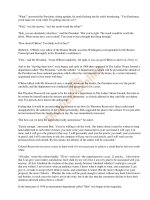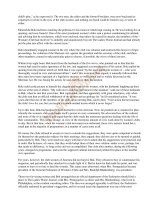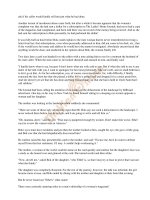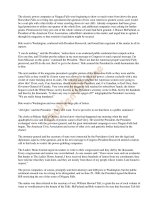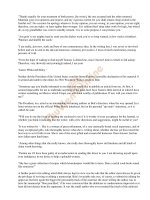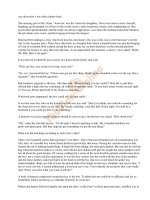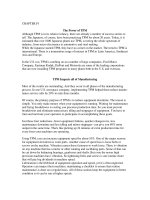Tài liệu The Americanization of Edward Bok 18 pdf
Bạn đang xem bản rút gọn của tài liệu. Xem và tải ngay bản đầy đủ của tài liệu tại đây (164.67 KB, 8 trang )
Still--
The friends of Edward Bok may be right when they said he made a mistake in his retirement.
However--
As Mr. Dooley says: "It's a good thing, sometimes, to have people size ye up wrong, Hinnessey: it's whin
they've got ye'er measure ye're in danger."
Edward Bok's friends have failed to get his measure--yet!
They still have to learn what he has learned and is learning every day: "the joy," as Charles Lamb so aptly put
it upon his retirement, "of walking about and around instead of to and fro."
The question now naturally arises, having read this record thus far: To what extent, with his unusual
opportunities of fifty years, has the Americanization of Edward Bok gone? How far is he, to-day, an
American? These questions, so direct and personal in their nature, are perhaps best answered in a way more
direct and personal than the method thus far adopted in this chronicle. We will, therefore, let Edward Bok
answer these questions for himself, in closing this record of his Americanization.
XXXVIII. Where America Fell Short with Me
When I came to the United States as a lad of six, the most needful lesson for me, as a boy, was the necessity
for thrift. I had been taught in my home across the sea that thrift was one of the fundamentals in a successful
life. My family had come from a land (the Netherlands) noted for its thrift; but we had been in the United
States only a few days before the realization came home strongly to my father and mother that they had
brought their children to a land of waste.
Where the Dutchman saved, the American wasted. There was waste, and the most prodigal waste, on every
hand. In every street-car and on every ferry-boat the floors and seats were littered with newspapers that had
been read and thrown away or left behind. If I went to a grocery store to buy a peck of potatoes, and a potato
rolled off the heaping measure, the groceryman, instead of picking it up, kicked it into the gutter for the
wheels of his wagon to run over. The butcher's waste filled my mother's soul with dismay. If I bought a scuttle
of coal at the corner grocery, the coal that missed the scuttle, instead of being shovelled up and put back into
the bin, was swept into the street. My young eyes quickly saw this; in the evening I gathered up the coal thus
swept away, and during the course of a week I collected a scuttleful. The first time my mother saw the
garbage pail of a family almost as poor as our own, with the wife and husband constantly complaining that
they could not get along, she could scarcely believe her eyes. A half pan of hominy of the preceding day's
breakfast lay in the pail next to a third of a loaf of bread. In later years, when I saw, daily, a scow loaded with
the garbage of Brooklyn householders being towed through New York harbor out to sea, it was an easy
calculation that what was thrown away in a week's time from Brooklyn homes would feed the poor of the
Netherlands.
At school, I quickly learned that to "save money" was to be "stingy"; as a young man, I soon found that the
American disliked the word "economy," and on every hand as plenty grew spending grew. There was literally
nothing in American life to teach me thrift or economy; everything to teach me to spend and to waste.
I saw men who had earned good salaries in their prime, reach the years of incapacity as dependents. I saw
families on every hand either living quite up to their means or beyond them; rarely within them. The more a
man earned, the more he--or his wife--spent. I saw fathers and mothers and their children dressed beyond their
incomes. The proportion of families who ran into debt was far greater than those who saved. When a panic
came, the families "pulled in"; when the panic was over, they "let out." But the end of one year found them
The Legal Small Print 176
precisely where they were at the close of the previous year, unless they were deeper in debt.
It was in this atmosphere of prodigal expenditure and culpable waste that I was to practise thrift: a
fundamental in life! And it is into this atmosphere that the foreign-born comes now, with every inducement to
spend and no encouragement to save. For as it was in the days of my boyhood, so it is to-day--only worse.
One need only go over the experiences of the past two years, to compare the receipts of merchants who cater
to the working-classes and the statements of savingsbanks throughout the country, to read the story of how the
foreign-born are learning the habit of criminal wastefulness as taught them by the American.
Is it any wonder, then, that in this, one of the essentials in life and in all success, America fell short with me,
as it is continuing to fall short with every foreign-born who comes to its shores?
As a Dutch boy, one of the cardinal truths taught me was that whatever was worth doing was worth doing
well: that next to honesty came thoroughness as a factor in success. It was not enough that anything should be
done: it was not done at all if it was not done well. I came to America to be taught exactly the opposite. The
two infernal Americanisms "That's good enough" and "That will do" were early taught me, together with the
maxim of quantity rather than quality.
It was not the boy at school who could write the words in his copy-book best who received the praise of the
teacher; it was the boy who could write the largest number of words in a given time. The acid test in
arithmetic was not the mastery of the method, but the number of minutes required to work out an example. If a
boy abbreviated the month January to "Jan."and the word Company to "Co." he received a hundred per cent
mark, as did the boy who spelled out the words and who could not make the teacher see that "Co." did not
spell "Company."
As I grew into young manhood, and went into business, I found on every hand that quantity counted for more
than quality. The emphasis was almost always placed on how much work one could do in a day, rather than
upon how well the work was done. Thoroughness was at a discount on every hand; production at a premium.
It made no difference in what direction I went, the result was the same: the cry was always for quantity,
quantity! And into this atmosphere of almost utter disregard for quality I brought my ideas of Dutch
thoroughness and my conviction that doing well whatever I did was to count as a cardinal principle in life.
During my years of editorship, save in one or two conspicuous instances, I was never able to assign to an
American writer, work which called for painstaking research. In every instance, the work came back to me
either incorrect in statement, or otherwise obviously lacking in careful preparation.
One of the most successful departments I ever conducted in The Ladies' Home Journal called for infinite
reading and patient digging, with the actual results sometimes almost negligible. I made a study of my
associates by turning the department over to one after another, and always with the same result: absolute lack
of a capacity for patient research. As one of my editors, typically American, said to me: "It isn't worth all the
trouble that you put into it." Yet no single department ever repaid the searcher more for his pains. Save for
assistance derived from a single person, I had to do the work myself for all the years that the department
continued. It was apparently impossible for the American to work with sufficient patience and care to achieve
a result.
We all have our pet notions as to the particular evil which is "the curse of America," but I always think that
Theodore Roosevelt came closest to the real curse when he classed it as a lack of thoroughness.
Here again, in one of the most important matters in life, did America fall short with me; and, what is more
important, she is falling short with every foreigner that comes to her shores.
In the matter of education, America fell far short in what should be the strongest of all her institutions: the
The Legal Small Print 177
public school. A more inadequate, incompetent method of teaching, as I look back over my seven years of
attendance at three different public schools, it is difficult to conceive. If there is one thing that I, as a
foreign-born child, should have been carefully taught, it is the English language. The individual effort to teach
this, if effort there was, and I remember none, was negligible. It was left for my father to teach me, or for me
to dig it out for myself. There was absolutely no indication on the part of teacher or principal of responsibility
for seeing that a foreign-born boy should acquire the English language correctly. I was taught as if I were
American-born, and, of course, I was left dangling in the air, with no conception of what I was trying to do.
My father worked with me evening after evening; I plunged my young mind deep into the bewildering
confusions of the language--and no one realizes the confusions of the English language as does the
foreign-born--and got what I could through these joint efforts. But I gained nothing from the much-vaunted
public-school system which the United States had borrowed from my own country, and then had rendered
incompetent-either by a sheer disregard for the thoroughness that makes the Dutch public schools the
admiration of the world, or by too close a regard for politics.
Thus, in her most important institution to the foreign-born, America fell short. And while I am ready to
believe that the public school may have increased in efficiency since that day, it is, indeed, a question for the
American to ponder, just how far the system is efficient for the education of the child who comes to its school
without a knowledge of the first word in the English language. Without a detailed knowledge of the subject, I
know enough of conditions in the average public school to-day to warrant at least the suspicion that
Americans would not be particularly proud of the system, and of what it gives for which annually they pay
millions of dollars in taxes.
I am aware in making this statement that I shall be met with convincing instances of intelligent effort being
made with the foreign-born children in special classes. No one has a higher respect for those efforts than I
have--few, other than educators, know of them better than I do, since I did not make my five-year study of the
American public school system for naught. But I am not referring to the exceptional instance here and there. I
merely ask of the American, interested as he is or should be in the Americanization of the strangers within his
gates, how far the public school system, as a whole, urban and rural, adapts itself, with any true efficiency, to
the foreign-born child. I venture to color his opinion in no wise; I simply ask that he will inquire and ascertain
for himself, as he should do if he is interested in the future welfare of his country and his institutions; for what
happens in America in the years to come depends, in large measure, on what is happening to-day in the public
schools of this country.
As a Dutch boy I was taught a wholesome respect for law and for authority. The fact was impressed upon me
that laws of themselves were futile unless the people for whom they were made respected them, and obeyed
them in spirit more even than in the letter. I came to America to feel, on every hand, that exactly the opposite
was true. Laws were passed, but were not enforced; the spirit to enforce them was lacking in the people. There
was little respect for the law; there was scarcely any for those appointed to enforce it.
The nearest that a boy gets to the law is through the policeman. In the Netherlands a boy is taught that a
policeman is for the protection of life and property; that he is the natural friend of every boy and man who
behaves himself. The Dutch boy and the policeman are, naturally, friendly in their relations. I came to
America to be told that a policeman is a boy's natural enemy; that he is eager to arrest him if he can find the
slightest reason for doing so. A policeman, I was informed, was a being to hold in fear, not in respect. He was
to be avoided, not to be made friends with. The result was that, as did all boys, I came to regard the policeman
on our beat as a distinct enemy. His presence meant that we should "stiffen up"; his disappearance was the
signal for us to "let loose."
So long as one was not caught, it did not matter. I heard mothers tell their little children that if they did not
behave themselves, the policeman would put them into a bag and carry them off, or cut their ears off. Of
course, the policeman became to them an object of terror; the law he represented, a cruel thing that stood for
The Legal Small Print 178
punishment. Not a note of respect did I ever hear for the law in my boyhood days. A law was something to be
broken, to be evaded, to call down upon others as a source of punishment, but never to be regarded in the light
of a safeguard.
And as I grew into manhood, the newspapers rang on every side with disrespect for those in authority. Under
the special dispensation of the liberty of the press, which was construed into the license of the press, no man
was too high to escape editorial vituperation if his politics did not happen to suit the management, or if his
action ran counter to what the proprietors believed it should be. It was not criticism of his acts, it was personal
attack upon the official; whether supervisor, mayor, governor, or president, it mattered not.
It is a very unfortunate impression that this American lack of respect for those in authority makes upon the
foreign-born mind. It is difficult for the foreigner to square up the arrest and deportation of a man who,
through an incendiary address, seeks to overthrow governmental authority, with the ignoring of an expression
of exactly the same sentiments by the editor of his next morning's newspaper. In other words, the man who
writes is immune, but the man who reads, imbibes, and translates the editor's words into action is immediately
marked as a culprit, and America will not harbor him. But why harbor the original cause? Is the man who
speaks with type less dangerous than he who speaks with his mouth or with a bomb?
At the most vital part of my life, when I was to become an American citizen and exercise the right of suffrage,
America fell entirely short. It reached out not even the suggestion of a hand.
When the Presidential Conventions had been held in the year I reached my legal majority, and I knew I could
vote, I endeavored to find out whether, being foreign-born, I was entitled to the suffrage. No one could tell
me; and not until I had visited six different municipal departments, being referred from one to another, was it
explained that, through my father's naturalization, I became, automatically, as his son, an American citizen. I
decided to read up on the platforms of the Republican and Democratic parties, but I could not secure copies
anywhere, although a week had passed since they had been adopted in convention.
I was told the newspapers had printed them. It occurred to me there must be many others besides myself who
were anxious to secure the platforms of the two parties in some more convenient form. With the eye of
necessity ever upon a chance to earn an honest penny, I went to a newspaper office, cut out from its files the
two platforms, had them printed in a small pocket edition, sold one edition to the American News Company
and another to the News Company controlling the Elevated Railroad bookstands in New York City, where
they sold at ten cents each. So great was the demand which I had only partially guessed, that within three
weeks I had sold such huge editions of the little books that I had cleared over a thousand dollars.
But it seemed to me strange that it should depend on a foreign-born American to supply an eager public with
what should have been supplied through the agency of the political parties or through some educational
source.
I now tried to find out what a vote actually meant. It must be recalled that I was only twenty-one years old,
with scant education, and with no civic agency offering me the information I was seeking. I went to the
headquarters of each of the political parties and put my query. I was regarded with puzzled looks.
"What does it mean to vote?" asked one chairman.
"Why, on Election Day you go up to the ballot-box and put your ballot in, and that's all there is to it."
But I knew very well that that was not all there was to it, and was determined to find out the significance of
the franchise. I met with dense ignorance on every hand. I went to the Brooklyn Library, and was frankly told
by the librarian that he did not know of a book that would tell me what I wanted to know. This was in 1884.
The Legal Small Print 179
As the campaign increased in intensity, I found myself a desired person in the eyes of the local campaign
managers, but not one of them could tell me the significance and meaning of the privilege I was for the first
time to exercise.
Finally, I spent an evening with Seth Low, and, of course, got the desired information.
But fancy the quest I had been compelled to make to acquire the simple information that should have been
placed in my hands or made readily accessible to me. And how many foreign-born would take equal pains to
ascertain what I was determined to find out?
Surely America fell short here at the moment most sacred to me: that of my first vote!
Is it any easier to-day for the foreign citizen to acquire this information when he approaches his first vote? I
wonder! Not that I do not believe there are agencies for this purpose. You know there are, and so do I. But
how about the foreign-born? Does he know it? Is it not perhaps like the owner of the bulldog who assured the
friend calling on him that it never attacked friends of the family? "Yes," said the friend, "that's all right. You
know and I know that I am a friend of the family; but does the dog know?"
Is it to-day made known to the foreign-born, about to exercise his privilege of suffrage for the first time,
where he can be told what that privilege means: is the means to know made readily accessible to him: is it, in
fact, as it should be, brought to him?
It was not to me; is it to him?
One fundamental trouble with the present desire for Americanization is that the American is anxious to
Americanize two classes--if he is a reformer, the foreign-born; if he is an employer, his employees. It never
occurs to him that he himself may be in need of Americanization. He seems to take it for granted that because
he is American-born, he is an American in spirit and has a right understanding of American ideals. But that,
by no means, always follows. There are thousands of the American-born who need Americanization just as
much as do the foreign-born. There are hundreds of American employers who know far less of American
ideals than do some of their employees. In fact, there are those actually engaged to-day in the work of
Americanization, men at the top of the movement, who sadly need a better conception of true Americanism.
An excellent illustration of this came to my knowledge when I attended a large Americanization Conference
in Washington. One of the principal speakers was an educator of high standing and considerable influence in
one of the most important sections of the United States. In a speech setting forth his ideas of Americanization,
he dwelt with much emphasis and at considerable length upon instilling into the mind of the foreign-born the
highest respect for American institutions.
After the Conference he asked me whether he could see me that afternoon at my hotel; he wanted to talk about
contributing to the magazine. When he came, before approaching the object of his talk, he launched out on a
tirade against the President of the United States; the weakness of the Cabinet, the inefficiency of the Congress,
and the stupidity of the Senate. If words could have killed, there would have not remained a single living
member of the Administration at Washington.
After fifteen minutes of this, I reminded him of his speech and the emphasis which he had placed upon the
necessity of inculcating in the foreign-born respect for American institutions.
Yet this man was a power in his community, a strong influence upon others; he believed he could
Americanize others, when he himself, according to his own statements, lacked the fundamental principle of
Americanization. What is true of this man is, in lesser or greater degree, true of hundreds of others. Their
Americanization consists of lip-service; the real spirit, the only factor which counts in the successful teaching
The Legal Small Print 180
